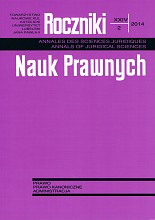Charakter prawa unijnego w orzecznictwie Trybunału Sprawiedliwości i sądów konstytucyjnych państw członkowskich
The character of EU law legislation in the practice of Court of Justice and member state constitutional tribunals
Author(s): Edyta KrzysztofikSubject(s): Law, Constitution, Jurisprudence
Published by: Towarzystwo Naukowe KUL & Katolicki Uniwersytet Lubelski Jana Pawła II
Keywords: EU law; the supremacy principle; Constitutional Tribunal; Federal Constitution Court; Italian Constitutional Court
Summary/Abstract: The purpose of this paper is to show a dependency between the opinions of the Court of Justice and the constitutional courts of the member states with regard to the definition of the basic principles of the EU law. The subject of the discussion focuses on only one principle – supremacy of the EU legislation, which is the most problematic issue. The scope of the discussion refers to opinions of constitutional courts, which are the most relevant for our study. The paper is divided into three chronological parts. The first part refers to the beginnings of the European Union, where cooperation between the member states focused on economic issues. Here, a reference is made to the opinions of the Federal Constitutional Court and Italian Constitutional Court. The second part also deals with economic cooperation, but the dialogue between the Court of Justice and constitutional tribunals becomes distinct in its character. Here, the first difference of opinion is demonstrated. Realising their competences, the European Communities take into consi-deration the rights and freedoms of individuals, fundamental rights protected by the constitutions of the member states. In this part, the adoption of a compromise between the Court of Justice and constitutional courts is presented. The third part concerns the creation of the EU, and thus the extension of its powers into new areas, which until 1992 were the domain of nation-states. In this context, there arises the problem of the scope of competence as well as the relationship between constitutions and the EU law. This part also considers the rulings of the Polish Constitutional Tribunal on the principle of supremacy to show the attitude of the newly accepted states towards the EU. Thus, the Author makes a reference to the judicature of the Federal Constitutional Court and the Polish Constitutional Tribunal. The considerations in this paper prove that despite differences regarding the interpretation and origin of the supremacy rule, constitutional courts and the Court of Justice seek to find an area of cooperation. Constitutional Courts do not suppress the jurisdiction of the Court of Justice but only indicate the limits of its juridical freedom. Whereas the Court of Justice accepts the cultural and sys-temic diversity of the member states, it interprets the EU law respecting the former.
Journal: Roczniki Nauk Prawnych
- Issue Year: 24/2014
- Issue No: 2
- Page Range: 007-030
- Page Count: 24
- Language: Polish

